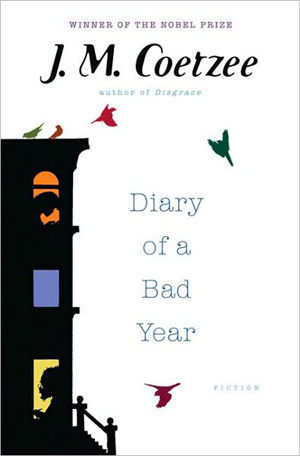
Every once in a while, I read a book because I think I should. Maybe an author has been nominated for an award, or wins an award, or keeps showing up on those lists of books you "should" read. So I try.
The first book I read by J. M. Coetzee was
Disgrace, and I read it in 2006. To me, it was the epitome of what has almost become an archetype in modern literature - the depressed, amoral, worn-out, male academic. My dislike was severe, I was surprised I finished it. I wondered if it was just because I couldn't identify with it, as a 28 year old who had just finished a graduate degree, at the beginning of her career and quite happily married. Imagine my horror upon discovering that this actually won the Man Booker Prize in 1999! Ha.
For whatever reason, probably the "shoulds," I read
Slow Man in 2007. It had actually been nominated for the Man Booker Prize in 2005. It contains a character from a previous book that I have not read, Elizabeth Costello. The main character was similar to the one in Disgrace, to the point that even the other characters in the novel point it out!
"She could not stay with a man who was tired all the time. It was hard enough to hold her own tiredness at bay. She had only to stretch out beside him in the too familiar bed to feel the weariness begin to seep out of him and wash over her in colourless, odourless, inert tide. She had to escape!"
When I was selecting books to read over the long holiday break, I thought maybe I would try giving Coetzee another chance. I brought three of his books home with me - Diary of a Bad Year, Summertime, and Elizabeth Costello. I made it through
Diary of a Bad Year, but found it suffered similar issues as the other two. Add to that the tone of it being written in an autobiographical tone (I believe it has even been called autobiographical fiction, a subgenre quite a bit of his work falls under), and the divided writing style, and it was torture.
I read the first chapter of Elizabeth Costello and of Summertime, but just couldn't force myself. I might just call it quits on Coetzee, kind of like I had to do with Brahms as a young pianist, after each reading through of a piece was worse than the one before. Maybe he would mean more to me later on in life. I hope not, because I fear that to identify with him more would be to have lived in misery.
But seriously, what am I missing? I am willing to continue forcing myself to have an open mind.
 The Imperfectionists by Tom Rachman
The Imperfectionists by Tom Rachman

